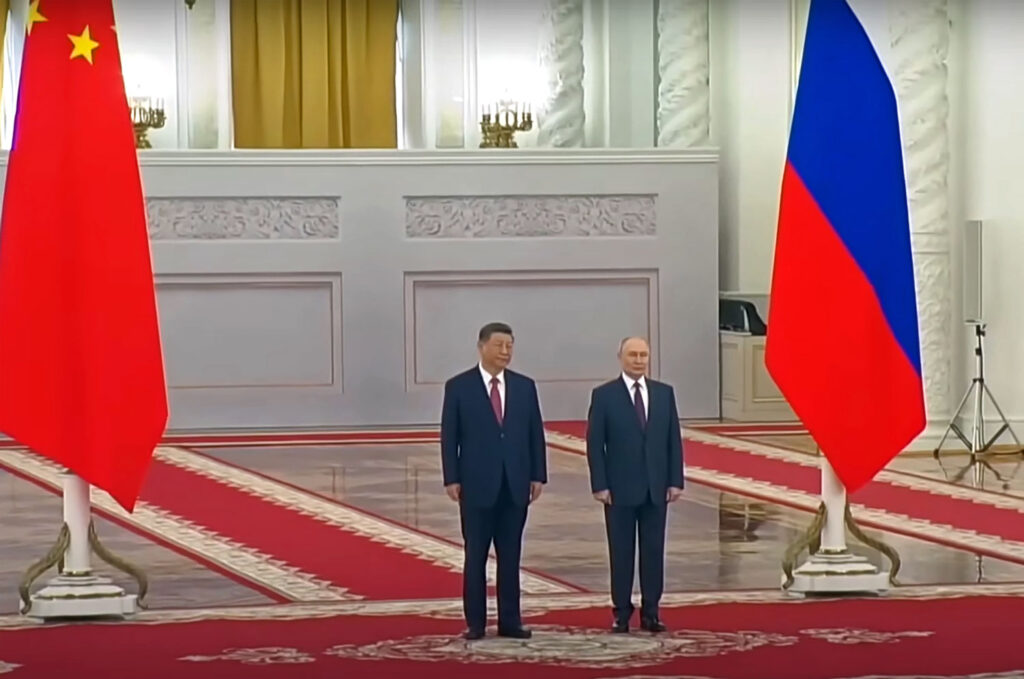
A secret Russian intelligence document obtained by The New York Times shows the FSB’s growing alarm over Chinese espionage, despite Moscow’s repeated public claims of an unbreakable friendship with Beijing.
China officially claims neutrality in the Russo-Ukrainian war, yet maintains strong economic ties with Russia and, according to Ukraine’s Foreign Intelligence Service, supplies components used in Russian ammunition and drone manufacturing. By early 2025, Chinese electronics reportedly made up 80% of those found in Russian drones. Beijing has denied the accusations, calling them unfounded and politically driven.
Although President Vladimir Putin has hailed a “limitless” partnership with Xi Jinping, Russia’s Federal Security Service (FSB) refers to China as “the enemy” in an internal memo that outlines counterespionage priorities. The undated eight-page planning document was likely written in late 2023 or early 2024 and was authenticated by six Western intelligence agencies contacted by The New York Times.
The FSB accuses Chinese intelligence of attempting to recruit Russian scientists, officials, and businesspeople, collecting military secrets related to Russia’s war in Ukraine, and using corporate and academic fronts to gather information in sensitive regions, including the Arctic and Central Asia.
The intelligence standoff unfolds as Putin and Xi continue to tighten their alliance, having met over 40 times since Russia’s full-scale invasion began. Though bound by economic needs, the two powers operate with deep mutual distrust, NYT says. Russia relies heavily on China for oil exports, electronics, and alternatives to Western companies. According to an FSB document, tensions persist within this strategic relationship.
Origins and validation of the document
The document was obtained by cybercrime group Ares Leaks, according to NYT. Although the group did not disclose how it accessed the file, six Western agencies deemed it credible. It is the most detailed known insight into the Russian counterintelligence view of China.
China provides 80% of critical electronics for Russian drones, intelligence agency says
Espionage targets and recruitment
The FSB claims Chinese agents are particularly focused on Russia’s military tactics in Ukraine, especially drone warfare, modernization methods, and countermeasures against Western weapons. Chinese defense-linked institutions reportedly flooded into Russia soon after the 2022 invasion, seeking firsthand data from the conflict.
The memo also mentions Beijing’s interest in Russia’s discontinued ekranoplan project and the recruitment of aviation scientists. Dissatisfied or financially pressured employees of aircraft research institutes were considered likely targets.
Digital surveillance and WeChat monitoring
The FSB directive includes the monitoring of Chinese messaging app WeChat and mandates hacking into phones of espionage suspects. Officers are instructed to accumulate data using internal software tools to identify threats and intercept leaks of strategic information.
Concern over territorial claims and historical revisionism
The FSB warns of Chinese academic efforts to find “ancient Chinese peoples” in Russia’s Far East and spread revanchist narratives. A 2023 Chinese map labeled areas of Russia with historical Chinese names. Officers are ordered to investigate such activities and restrict access for involved foreigners.
Russia, China declare joint front against US as Xi wants “end to external interference” in Moscow
Intelligence tension in the Arctic and Central Asia
The document also highlights Beijing’s growing interest in Russia’s Arctic development and the Northern Sea Route. FSB analysts believe Chinese spies use mining companies and academic research to access strategic data.
Managing risk without disrupting ties
Despite these concerns, the FSB is cautious not to trigger diplomatic fallout. The document advises against public statements labeling China a threat and requires high-level approval before any sensitive actions.
You could close this page. Or you could join our community and help us produce more materials like this.
We keep our reporting open and accessible to everyone because we believe in the power of free information. This is why our small, cost-effective team depends on the support of readers like you to bring deliver timely news, quality analysis, and on-the-ground reports about Russia's war against Ukraine and Ukraine's struggle to build a democratic society.
A little bit goes a long way: for as little as the cost of one cup of coffee a month, you can help build bridges between Ukraine and the rest of the world, plus become a co-creator and vote for topics we should cover next.
Become a patron or see other ways to
support.
Become a Patron!


